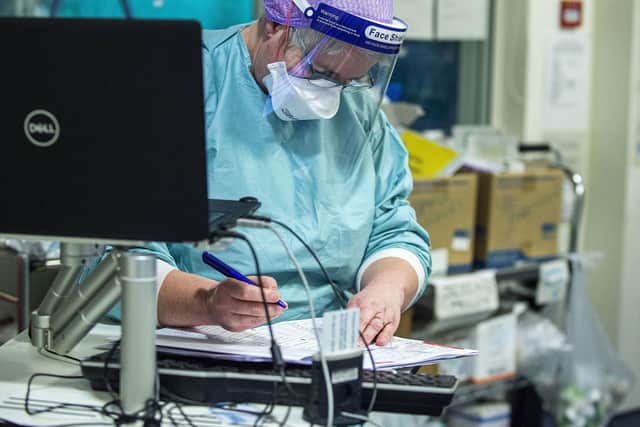Scotland should prepare for third wave of Covid in winter, says epidemiologist
Most health experts believe Covid-19 is “here to stay”, Prof Woolhouse told a virtual conference held by the Royal College of Physicians of Edinburgh on Wednesday, but the next wave will hopefully not be as severe as the previous ones.
In a presentation on the state of the epidemic in Scotland Prof Woolhouse also said case numbers in Scotland were being underestimated by more than half, and that more testing should be introduced to help close the gap.
Advertisement
Hide AdAdvertisement
Hide AdAnd he argued the first lockdown in Scotland failed to protect a large number of very vulnerable people, with more fatal Covid-19 infections acquired in care homes and hospitals than there should have been.


Covid-19 death figures show the virus was not eliminated in Scotland last summer, Prof Woolhouse said, which suggests that even with case numbers down and vaccination rates high, it will not be gone by next winter either.
Some public health experts, including national clinical director Jason Leitch, believe the virus was briefly eliminated during the summer.
Prof Woolhouse, who has previously argued against the elimination theory, said on Wednesday: “The genomics confirms the fact that the virus did persist in Scotland over the summer.
"Clearly we hope that the numbers of cases this summer will fall very low, that's likely, because we now have the vaccine rollout ... but most commentators would say that it's extremely unlikely that we're going to eliminate the virus.
"What we have to be prepared for is some kind of third wave next winter, that’s hopefully nothing like as severe as the wave we've had this winter.”
Prof Woolhouse said the virus was “here to stay”.
"There has been a lot of discussion over the last year about the prospect of zero Covid, which basically means achieving global eradication of the virus,” he said.
"The journal the scientific journal Nature did a survey of over 100 experts at this recently, and there was really no support for the idea that global eradication of this virus is a realistic short term or even medium-term aim at the moment.
Advertisement
Hide AdAdvertisement
Hide Ad"The virus is indeed here to stay. There wasn't very much support among those experts either for the idea that individual countries will be able to eliminate infection for a long period of time.”
Speaking at the same conference, Linda Bauld, professor of public health at Edinburgh University, said Scotland would need to plan for Covid-19 as a regular seasonal infection.
“Thinking about public health messaging and communication with the public in the future, we're going to move from a pandemic to a situation where the virus is not a threat to health from potentially everyone in the world, which is the definition of a pandemic, but to SARS-CoV-2 as a recurrent seasonal infection,” she said.
“Looking to the future, we're going to have to plan for and manage winter hospital surges, reduce transmission in workplaces and educational settings – reintroducing mitigating measures and protecting the most vulnerable – and we're going to need to continue to communicate with the public about why those changes, why that continued effort may be needed, and why there will be potential outcomes which can affect many of us in the country from this.”
Prof Woolhouse said Scotland was underestimating Covid-19 case numbers by more than half, which was “handicapping” the ability to control infection.
“It’s a problem, because if we're not picking up those cases, we can't be sure that those cases are self isolating – they may well not be,” he said.
“They are certainly not having their contacts traced or the contacts being asked to self isolate, so this is handicapping our ability to control the spread of infection.
“And that handicap is having to be picked up with other measures, including social distancing measures, such as lockdowns. We could certainly do more in that area.”
Advertisement
Hide AdAdvertisement
Hide AdIt is now widely recognised that more could have been done to protect care home residents, Prof Woolhouse said, adding that hospital patients could also have been better protected from Covid-19 during the first wave.
“We know that just over a third of Covid-19 deaths in Scotland so far have been care home residents, and it's recognised quite widely now that perhaps more should and could have been done to protect care home residents, particularly in the first wave, in Scotland and elsewhere,” he said.
“That leaves the other two thirds of the deaths, which occurred in the community, and vulnerable people in the community.
“I think we also have to accept that we could have done a lot more to protect those vulnerable people in the community as well.”
He added: “We estimate that somewhere up to three quarters of fatal infections occurred after the lockdown was imposed.
“What I conclude from that is that lockdown, whatever it did to reduce the transmission and save lives in Scotland, failed to protect a large number of very vulnerable people.
“We need to look at whether we could have done more to do that.”
Prof Woolhouse pointed to a recent pre-print study by colleagues at Edinburgh University, which showed that one reason why people were still dying during lockdown was because they were exposed to infection in hospital.
Advertisement
Hide AdAdvertisement
Hide Ad“That's an obvious place where we could have done more to protect the vulnerable people in the community that were having to spend some time in hospital during lockdown,” he said.
A message from the Editor:
Thank you for reading this article. We're more reliant on your support than ever as the shift in consumer habits brought about by coronavirus impacts our advertisers.
If you haven't already, please consider supporting our trusted, fact-checked journalism by taking out a digital subscription.
Comments
Want to join the conversation? Please or to comment on this article.